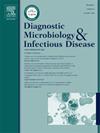甲氧苄氨嘧啶/磺胺甲恶唑过敏的免疫正常成人脑脓肿的成功治疗:1例报告和回顾
IF 2.1
4区 医学
Q3 INFECTIOUS DISEASES
Diagnostic microbiology and infectious disease
Pub Date : 2025-06-11
DOI:10.1016/j.diagmicrobio.2025.116954
引用次数: 0
摘要
背景:法氏诺卡菌脑脓肿在免疫正常的个体中是罕见的。甲氧苄啶/磺胺甲恶唑(TMP/SMX)是一线治疗,但过敏反应需要替代方案。本报告详细介绍了TMP/ smx过敏患者的成功管理。病例报告:一名38岁男性免疫功能正常,表现为反复发作。MRI显示左侧额叶病变扩大。手术切除和新一代宏基因组测序(mNGS)证实了葡萄球菌。由于对TMP/SMX过敏,采用另一种抗生素方案,包括静脉注射亚胺培南/西司他汀18天,阿米卡星7天,随后口服阿莫西林435天,米诺环素252天。这种治疗方法有效地控制了感染,28个月的随访期间持续的临床改善证明了这一点。farcinica脑脓肿可发生在免疫功能正常的成人,对TMP/SMX不耐受的治疗提出挑战。这个病例表明替代方案——亚胺培南/西司他汀、阿米卡星、阿莫西林和米诺环素——可以实现持续缓解。基于药物敏感性和患者因素的个体化治疗至关重要。本文章由计算机程序翻译,如有差异,请以英文原文为准。
Successful management of Nocardia farcinica brain abscess in an immunocompetent adult with trimethoprim/sulfamethoxazole hypersensitivity: A case report and review
Background
Nocardia farcinica brain abscesses are rare in immunocompetent individuals. Trimethoprim/sulfamethoxazole (TMP/SMX) is first-line therapy, but hypersensitivity reactions necessitate alternative regimens. This report details successful management in a TMP/SMX-allergic patient.
Case Report
A 38-year-old immunocompetent male presented with recurrent seizures. MRI revealed expanding left frontal lobe lesions. Surgical excision and metagenomic next-generation sequencing (mNGS) confirmed N. farcinica. Due to hypersensitivity to TMP/SMX, an alternative antibiotic regimen consisting of intravenous imipenem/cilastatin for 18 days and amikacin for 7 days was administered, followed by oral amoxicillin for 435 days and minocycline for 252 days. This therapeutic approach resulted in effective infection control, as evidenced by sustained clinical improvement over a 28-month follow-up period.
Conclusion
N. farcinica brain abscess can occur in immunocompetent adults, posing therapeutic challenges with TMP/SMX intolerance. This case demonstrates that alternative regimens—imipenem/cilastatin, amikacin, amoxicillin, and minocycline—can achieve sustained remission. Individualized therapy based on drug susceptibility and patient factors is critical.
求助全文
通过发布文献求助,成功后即可免费获取论文全文。
去求助
来源期刊
CiteScore
5.30
自引率
3.40%
发文量
149
审稿时长
56 days
期刊介绍:
Diagnostic Microbiology and Infectious Disease keeps you informed of the latest developments in clinical microbiology and the diagnosis and treatment of infectious diseases. Packed with rigorously peer-reviewed articles and studies in bacteriology, immunology, immunoserology, infectious diseases, mycology, parasitology, and virology, the journal examines new procedures, unusual cases, controversial issues, and important new literature. Diagnostic Microbiology and Infectious Disease distinguished independent editorial board, consisting of experts from many medical specialties, ensures you extensive and authoritative coverage.

 求助内容:
求助内容: 应助结果提醒方式:
应助结果提醒方式:


